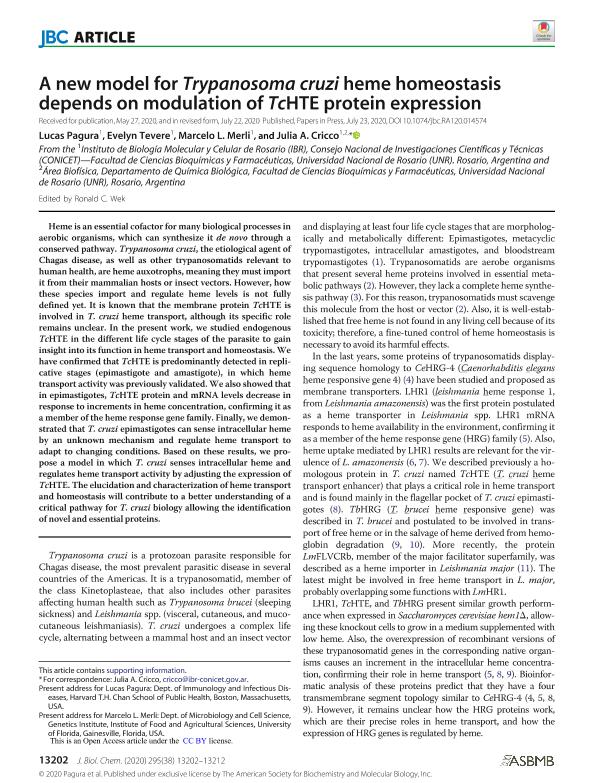Mostrar el registro sencillo del ítem
dc.contributor.author
Pagura, Lucas

dc.contributor.author
Tevere, Evelyn

dc.contributor.author
Merli, Marcelo Luciano

dc.contributor.author
Cricco, Julia Alejandra

dc.date.available
2023-01-27T14:44:08Z
dc.date.issued
2020-09
dc.identifier.citation
Pagura, Lucas; Tevere, Evelyn; Merli, Marcelo Luciano; Cricco, Julia Alejandra; A new model for Trypanosoma cruzi heme homeostasis depends on modulation of TcHTE protein expression; American Society for Biochemistry and Molecular Biology; Journal of Biological Chemistry (online); 295; 38; 9-2020; 13202-13212
dc.identifier.issn
0021-9258
dc.identifier.uri
http://hdl.handle.net/11336/185926
dc.description.abstract
Heme is an essential cofactor for many biological processes in aerobic organisms, which can synthesize it de novo through a conserved pathway. Trypanosoma cruzi, the etiological agent of Chagas disease, as well as other trypanosomatids relevant to human health, are heme auxotrophs, meaning they must import it from their mammalian hosts or insect vectors. However, how these species import and regulate heme levels is not fully defined yet. It is known that the membrane protein TcHTE is involved in T. cruzi heme transport, although its specific role remains unclear. In the present work, we studied endogenous TcHTE in the different life cycle stages of the parasite to gain insight into its function in heme transport and homeostasis. We have confirmed that TcHTE is predominantly detected in replicative stages (epimastigote and amastigote), in which heme transport activity was previously validated. We also showed that in epimastigotes, TcHTE protein and mRNA levels decrease in response to increments in heme concentration, confirming it as a member of the heme response gene family. Finally, we demonstrated that T. cruzi epimastigotes can sense intracellular heme by an unknown mechanism and regulate heme transport to adapt to changing conditions. Based on these results, we propose a model in which T. cruzi senses intracellular heme and regulates heme transport activity by adjusting the expression of TcHTE. The elucidation and characterization of heme transport and homeostasis will contribute to a better understanding of a critical pathway for T. cruzi biology allowing the identification of novel and essential proteins.
dc.format
application/pdf
dc.language.iso
eng
dc.publisher
American Society for Biochemistry and Molecular Biology

dc.rights
info:eu-repo/semantics/openAccess
dc.rights.uri
https://creativecommons.org/licenses/by/2.5/ar/
dc.subject
Trypanosoma cruzi
dc.subject
CHAGAS DISEASE
dc.subject
HEME
dc.subject
HEME TRANSPORT
dc.subject.classification
Bioquímica y Biología Molecular

dc.subject.classification
Ciencias Biológicas

dc.subject.classification
CIENCIAS NATURALES Y EXACTAS

dc.title
A new model for Trypanosoma cruzi heme homeostasis depends on modulation of TcHTE protein expression
dc.type
info:eu-repo/semantics/article
dc.type
info:ar-repo/semantics/artículo
dc.type
info:eu-repo/semantics/publishedVersion
dc.date.updated
2021-09-06T21:04:00Z
dc.journal.volume
295
dc.journal.number
38
dc.journal.pagination
13202-13212
dc.journal.pais
Estados Unidos

dc.journal.ciudad
Bethesda
dc.description.fil
Fil: Pagura, Lucas. Consejo Nacional de Investigaciones Científicas y Técnicas. Centro Científico Tecnológico Conicet - Rosario. Instituto de Biología Molecular y Celular de Rosario. Universidad Nacional de Rosario. Facultad de Ciencias Bioquímicas y Farmacéuticas. Instituto de Biología Molecular y Celular de Rosario; Argentina
dc.description.fil
Fil: Tevere, Evelyn. Consejo Nacional de Investigaciones Científicas y Técnicas. Centro Científico Tecnológico Conicet - Rosario. Instituto de Biología Molecular y Celular de Rosario. Universidad Nacional de Rosario. Facultad de Ciencias Bioquímicas y Farmacéuticas. Instituto de Biología Molecular y Celular de Rosario; Argentina
dc.description.fil
Fil: Merli, Marcelo Luciano. Consejo Nacional de Investigaciones Científicas y Técnicas. Centro Científico Tecnológico Conicet - Rosario. Instituto de Biología Molecular y Celular de Rosario. Universidad Nacional de Rosario. Facultad de Ciencias Bioquímicas y Farmacéuticas. Instituto de Biología Molecular y Celular de Rosario; Argentina
dc.description.fil
Fil: Cricco, Julia Alejandra. Consejo Nacional de Investigaciones Científicas y Técnicas. Centro Científico Tecnológico Conicet - Rosario. Instituto de Biología Molecular y Celular de Rosario. Universidad Nacional de Rosario. Facultad de Ciencias Bioquímicas y Farmacéuticas. Instituto de Biología Molecular y Celular de Rosario; Argentina. Universidad Nacional de Rosario. Facultad de Ciencias Bioquímicas y Farmacéuticas. Departamento de Química Biológica. Área Biofísica; Argentina
dc.journal.title
Journal of Biological Chemistry (online)

dc.relation.alternativeid
info:eu-repo/semantics/altIdentifier/url/http://www.jbc.org/lookup/doi/10.1074/jbc.RA120.014574
dc.relation.alternativeid
info:eu-repo/semantics/altIdentifier/doi/https://doi.org/10.1074/jbc.RA120.014574
Archivos asociados
